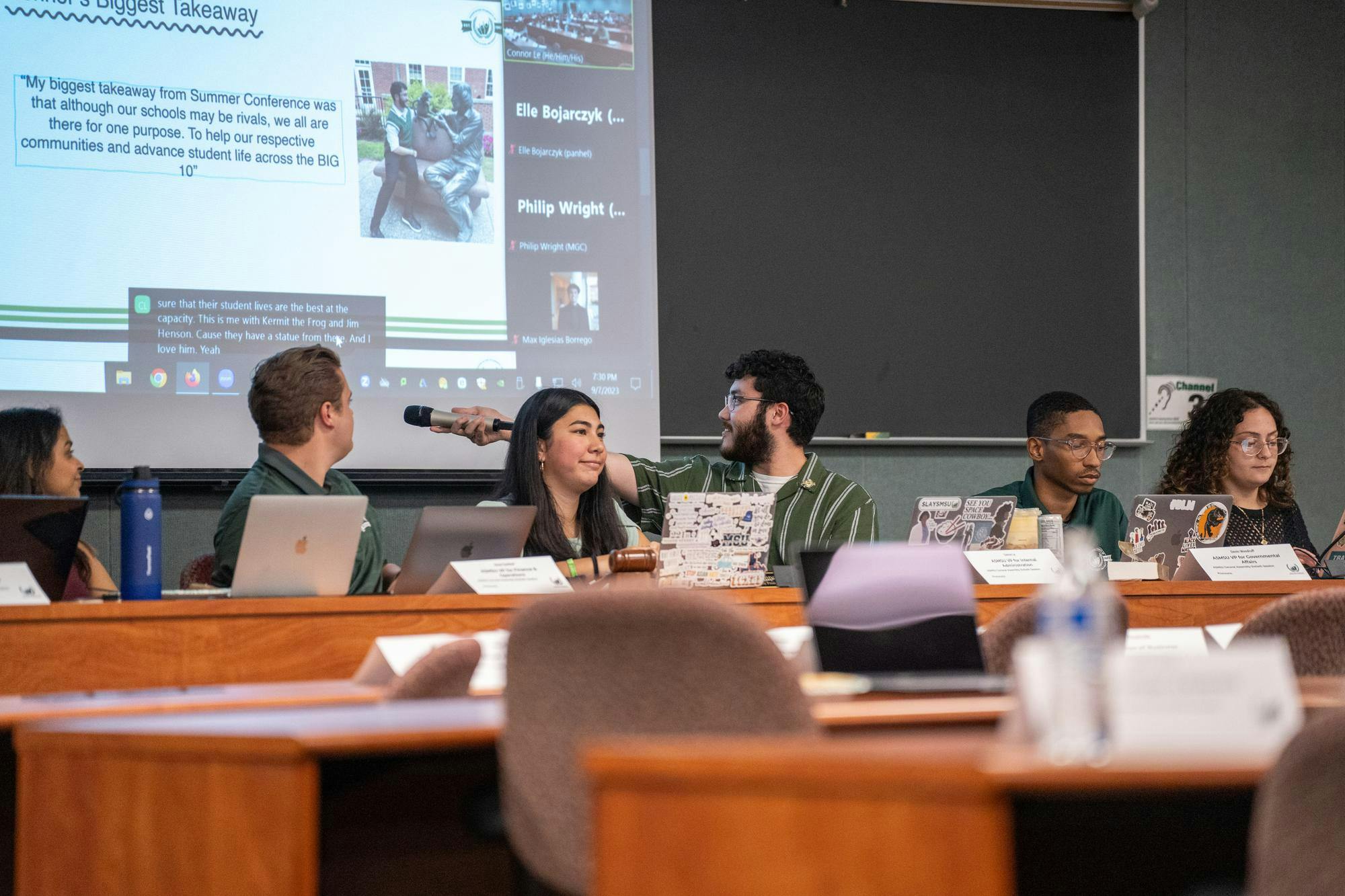A controversial bill that would require Associated Students of MSU representatives to disclose intra-organizational romantic relationships to the Office of the President was a focus of debate at the Sept. 21 general assembly meeting.
Bill 60-22 was written to prevent relationships between ASMSU members from interfering with general assemblies. Past romantic relationships between members had negatively impacted the organization, creating “hostile work environments” and once caused a member in ASMSU's office of the president, or OTP, to resign, President Emily Hoyumpa and Vice President of Internal Affairs Connor Le said.
“We've had multiple instances where … two people got together and it created an unequal power balance (and) really weird power dynamics,” Le said, adding that it affected how representatives voted.
College of Business Representative Delaney Jones motioned to table bills 60-22 and 60-23 for the next general assembly meeting, citing members’ lack of familiarity with the content. This led to an almost half-hour discussion about whether to table the bills for the next meeting or to discuss them now.
Once Jones rescinded her motion to table the bills, representatives discussed the benefits and drawbacks of bill 60-22.
Some representatives believed the bill had good intentions but should be reworked in next week’s committee meeting, while others, like Campus Interfaith Council Representative Vishvendra Chouhan, wanted to “kill the bill dead in its path, right now.”
“I think it’s very personal, and a lot of these things I don’t think need to be discussed with ASMSU,” Chouhan said. “Personally, I’m not really comfortable discussing these things, nor reporting it to faculty or any other person.”
Multiple representatives, including two OTP members, noted how disclosing a relationship may go against some students’ cultures, potentially putting them in an “unsafe situation.”
“I feel like this might unintentionally force students to out themselves, because not everybody is in a safe enough place where they’re able to report their relationship,” Lyman Briggs College Representative Kirthi Krishnan said, using same-sex relationships as an example.
ASMSU Diversity, Equity and Inclusion Coordinator Alissa Hakim said, as an Arab Muslim, her cultures have “a lot of taboos when speaking about relationships,” but she still believed the bill was needed.
“In every single other job and workplace, you are going to have to report relationships when you are with coworkers … especially when you are in a supervisor-supervisee type of role,” Hakim said. “As OTP, we are kind of supervisors for (the general assembly), for the people within our offices, and I think that part is the most important part of the bill.”
Students with Disabilities Representative Gillian Robbins agreed that the bill “reads very much like a workplace contract."
“Considering we’ve had problems with people in the past with (relationships affecting assemblies), I strongly disagree with the motion to kill the bill," Robbins said.
However, because some ASMSU members are in paid positions while others are volunteers, Residential Halls Association Representative Evan Hu said “there may be a slight disconnect" between the two groups.
“I believe that, as we are being paid, we should be held to a higher standard and should have to report ourselves,” Hu said. “However, as student volunteers, a lot of you have personal reasons or cultural reasons and are under no obligation to report it.”
Le said representatives would be expected to self-report their relationships, with only those in the relationship and the OTP needing to be aware. However, multiple representatives pointed out that enforcement would be a problem, both in ethics and in practice.
On the flip-side, College of Social Sciences Representative Evan Anderson said he liked another section of the bill, which aims to minimize nepotism when campaigning for a seat, because “it’s very easy to define ‘family member.’”
James Madison College Representative Shaurya Pandya liked some aspects of the bill, but he reconsidered when enough people expressed how reporting relationships could be detrimental to their privacy and cultures. He also felt unsure about how any one of them could define what type of relationship should be reported and what could stay private.
“Close friendships — which, I’m gonna be honest, has defined this organization in many ways — they can also be described as conflicts of interests,” Pandya said. “And the truth is, there’s not much we can do about that, because we’re university students. We’re here with the shared interest in representing students.”
For these reasons, Pandya said he found difficulty voting ‘yes’ on the bill.
With five votes in favor, 14 against, and 11 abstentions, bill 60-22 failed.




